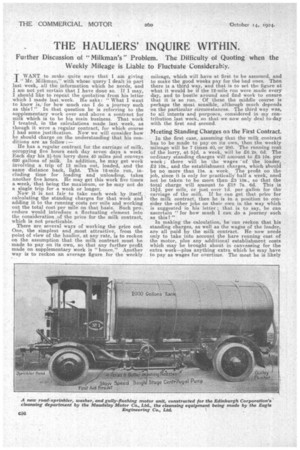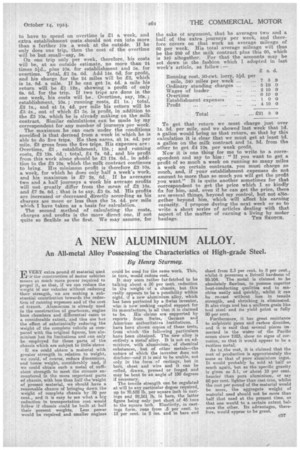THE HAULIERS' INQUIRE WITHIN.
Page 20

Page 21

If you've noticed an error in this article please click here to report it so we can fix it.
Further Discussion of " Milkman's " Problem. The Difficulty of Quoting when the Weekly Mileage is Liable to Fluctuate Considerab4.
T WANT to make quite sure that I am giving -1.." Mr. Milkman," with whose query I dealt in part last week, all the information which he needs, and I am not yet certain that I have done so. If I may, I should like to repeat the quotation from his letter which I made last week. He asks: "What I want to know is, for how much can I do a journey such as this?" In that question he is referring to the supplementary work over and above a contract for milk which is to be his main business. That work I treated, in the calculations made last week, as though it were a regular contract, for which course I had some justification. Now we will consider how he should charge on the understanding that his conditions are as follow :—
He has a regular contract for the carriage of milk, occupying five hours each day seven days a week. Each day his 21-ton lorry does 40 miles and conveys 620 gallons of milk. In addition, he may get work involving a trip of 12 miles out, loaded, and the same distance back, light. This 12-mile run, including time for loading and unloading, takes another five hours. He may get this work five times a (week, that being the maximum, or he may not do a single trip for a week or longer. Now it is not fair to take each week by itself.. calculating the standing charges for that week and adding it to the running costs per mile and working out the total cost per mile on that basis. Such procedure would introduce a fluctuating element into the consideration of the price for the milk contract, which is not practicable.
There are several ways of working the price out. One, the simplest and most attractive, from the point of view of the haulier, at any rate, is to reckon on the assumption that the milk contract must be made to pay on its own, so that any further profit made on supplementary work is "bunce." Another way is to reckon an average figure for the weekly
mileage, which will have at first to be assumed, and to make the good weeks pay for the bad ones. Then there is a third way, and that is to set the figure at what it would be if the 12-mile run were made every day, and to bustle around and find work to ensure that it is so run. Of these the middle course is perhaps the most sensible, although much depends on the particular circumstances. The third way was, to all intents and purposes, considered in my contribution last week, so that we now only deal to-day with the first and second.
Meeting Standing Charges on the First Contract.
In the first case, assuming that the milk contract has to be made to pay on its own, then the weekly mileage will be 7 times 40, or 280. The running cost of the lorry, at 5.1d. a week, will be £62s. Gd. The ordinary standing charges will amount to 25 10s. per week ; there will be the wages of the loader, 22 10s., and the establishment charges, which should be no more than 15s. a week. The profit on the job, since it is only for practically half a week, need not be taken to be more than 23 10s., so that the total charge ivill amount to 218 7s. 6d. This is 15id. per mile, or just over id. per gallon for the carriage of the milk. If he can get that price for the milk contract, then he is in a position to consider the other jobs on their own in the way which is suggested in his letter that is to say, he can ascertain "for how much 1 can do a journey such as this?"
In making the calculation, he' can reckon that his standing charges, as well as the wages of the loader, are all paid by the milk contract. He now needs only to take into account the bare running cost of the motor, plus any additional establishment costs which may be brought about in canvassing for the extra work—plus anything extra which he may have to pay as wages for overtime. The most he is likely
to have to spend on overtime is 21 a week, and extra establishment costs should not run into more than a further lOs a week at the outside. If he only does one trip, then the cost of the overtime will be but small-say, 55. On one trip only per week, therefore, his costs will be at an outside estimate, no more than 24
times be, plus 10s. for establishment and 5s. for overtime. Total, 21 5s. 6d. Add 14s. 6d for profit, and his charge for the 24 miles will be £2, which is is. 8d. a mile. If he can get Is. 4d. a mile his return will be £1 12s., showing a profit of only 6s. 6d. for the trip. If two trips are done in the one week, his costs will be. Overtime, say, 105."
'
establishment, 10s. • running costs, 21 is. ; total, 22 is., and at Is. 4d. per mile his return will be
4s., out of which £1 3s. is profit, in addition to the £3 10s, which he is already making on the milk contract. Similar calculations can be made by my correspondent for any number of journeys per week.
The maximum he can earn under the conditions specified is that derived from a week in which he is able to do five trips. He then earns, at is. 4d. per mile, 28 gross from the five trips. His expenses are : Overtime, £1, establishment, 15s.; and running costs, £2 128. Gd. ; total, 24 7s. 6c1., and his profit from this work alone should be 23 12s. 6d., in addition to the £3 I0s. which the milk contract continues to bring. His minimum profit is therefore 23 10s. a week, for which he does only half a week's work, and his maximum is £7 2s. 6d. If he averages two and a half journeys a Week his average profits will not greatly differ from the mean of E3 10s. and 27 2s. 6d. ; that is to say, 25 Cs. 3d. His profits are increased or decreased directly according as his charges are more or less than the Is. 4d. per mile which r have taken as a basis for calculation.
The second method of calculating the costs, charges and profits is the more direct one, if not quite so flexible as the first. We may assume, for the sake ot argument, that he averages two and a half of the extra journeys per week, and therefore covers on that work an average mileage of 60 per week. His total average mileage will thus be the 280 of the milk contract plus this 60, which is 340 altogether. For that the accounts may be set down in the fashion which I adopted in last To get that return we must charge just over is. 3d. per mile, and we showed last week that id. a gallon would bring us that return, so that by this calculation it is clear that we must get at least id. a gallon on the milk contract and is. 3d. from the other to get £4 105. per week profit.
Now it is one thing for me to write to a correspondent and say to him: "If you want to get a profit of so much a week on running so many miles a week on certain contracts, you must charge so much, and, if your establishment expenses do not amount to more than so much you will get the profit you want." It is quite another sometimes for that correspondent to get the price which I so kindly fix for him, and, even if he can get the price, there are several things, beyond my control, but not altogether beyond him, which will affect his earning capacity. I propose during the next week or so to write a short series of articles dealing with that aspect of the matter of earning a living by motor
haulage. THE SKOTCH.






























